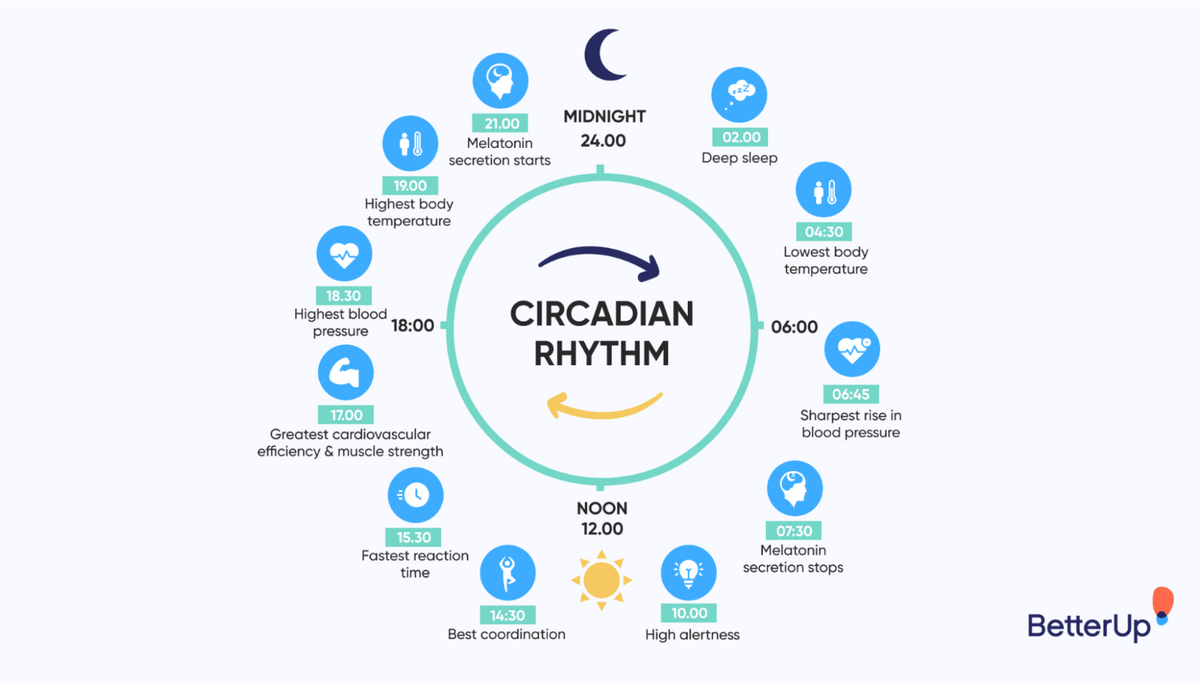The main regulators of our circadian rhythm can be divided into two categories: environmental cues and internal biological mechanisms.
ENVIRONMENTAL:
- Light: Light, particularly sunlight, is the most powerful synchronizer of our circadian rhythm. It enters our eyes and reaches the suprachiasmatic nucleus (SCN), a tiny area in the hypothalamus that acts as our body's internal clock. When light hits the SCN, it suppresses the production of melatonin, a hormone that makes us sleepy. This helps to keep us awake and alert during the day. Darkness, on the other hand, signals to the SCN to start producing melatonin, which prepares us for sleep.

- Mealtimes: The timing of our meals can also influence our circadian rhythm. When we eat, our bodies release hormones like insulin and leptin, which can signal to the SCN that it's time to be awake and active. Eating late at night can therefore make it harder to fall asleep.
- Exercise: Regular exercise can help to regulate our circadian rhythm, especially if it's done outdoors in the sunlight. Exercise can also help to improve sleep quality.
INTERNAL
- Clock genes: Our circadian rhythm is regulated by a set of genes called "clock genes". These genes produce proteins that turn on and off throughout the day and night, creating a 24-hour cycle.
- Neurotransmitters: Neurotransmitters like dopamine and serotonin also play a role in regulating our circadian rhythm. These chemicals help to control our mood, alertness, and sleep-wake cycle.
- Hormones: Hormones like melatonin, cortisol, and growth hormone also play a role in regulating our circadian rhythm. These hormones have different levels of activity throughout the day and night, and they help to signal to the body when it's time to sleep or wake up.
Understanding how our circadian rhythm is regulated can help us to make lifestyle choices that promote better sleep and overall health. For example, if you have trouble sleeping, you can try to get more sunlight exposure during the day, avoid eating late at night, and establish a regular sleep schedule.
Circadian rhythm's role in weight:
- Hormonal regulation: Our internal clock regulates the release of hormones like leptin (suppresses appetite) and ghrelin (stimulates hunger) throughout the day. Disruption of this rhythm can throw these hormones off balance, leading to increased hunger and cravings at night, potentially contributing to weight gain.
- Metabolic processes: Digestion, insulin sensitivity, and fat storage are also tied to circadian rhythm. Late-night eating, for example, can disrupt these processes, leading to inefficient calorie burning and potentially more fat storage.
- Leptin release: Think of leptin as your body's internal fat gauge. This hormone, made by fat cells, tells your brain how much fuel you've got in the tank.
- High levels? Time to slow down on the snacks and crank up the activity.
- Low levels? Your brain nudges you to eat and replenish those reserves. It's all about keeping your energy balance in check.
- Muddled circadian rhythm (i.e.: working night shifts, no sunlight during the day, etc.) is a major contributors to leptin resistance, alongside food intake (restrictive eating, under eating, overeating, etc.) and stress (cortisol can impair leptin's ability to communicate with the brain).

